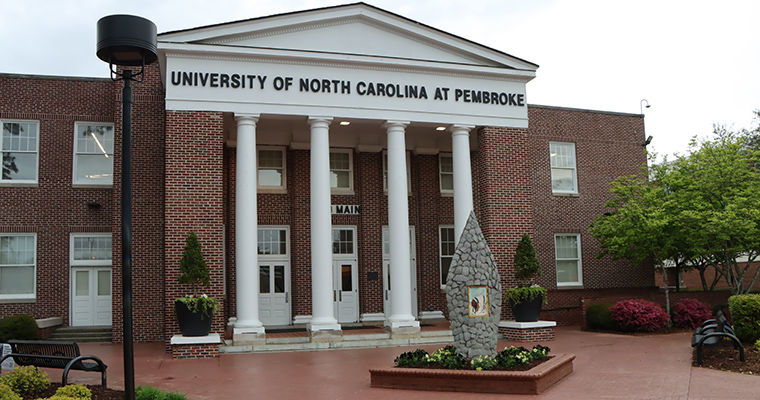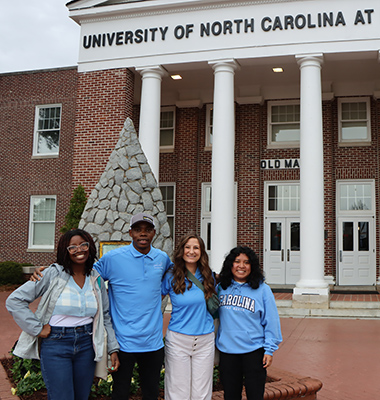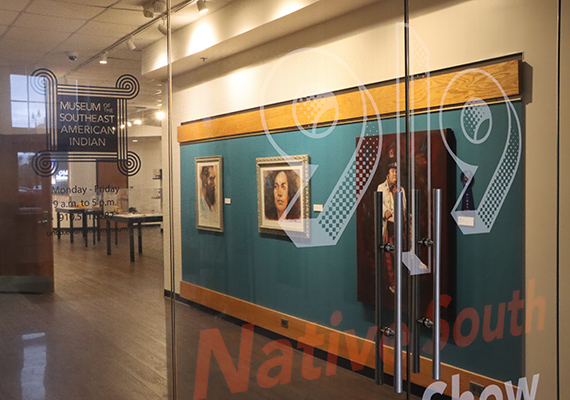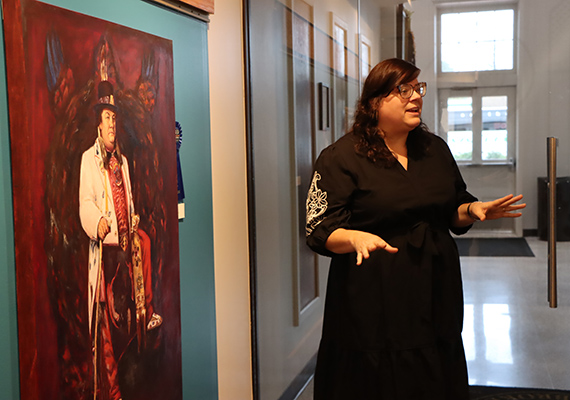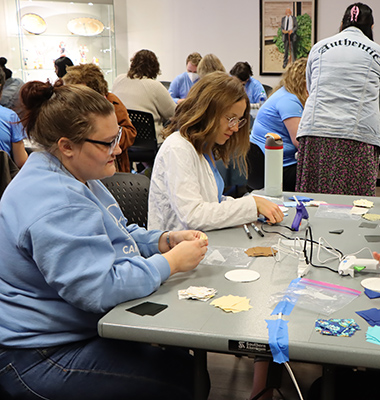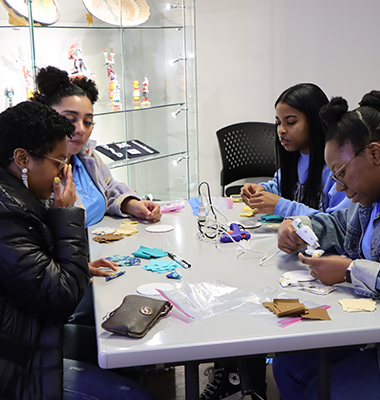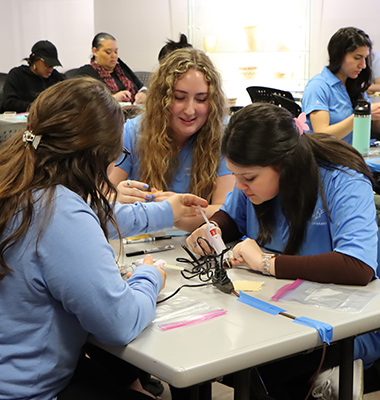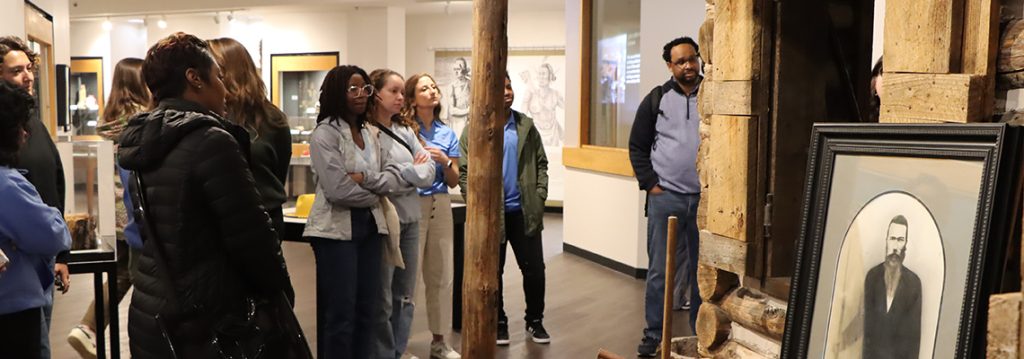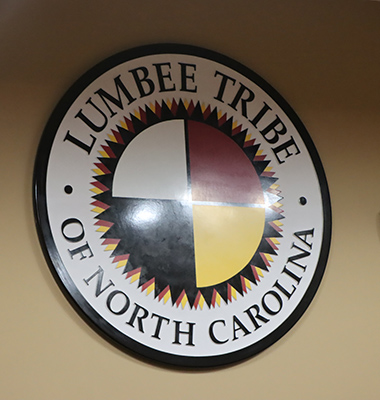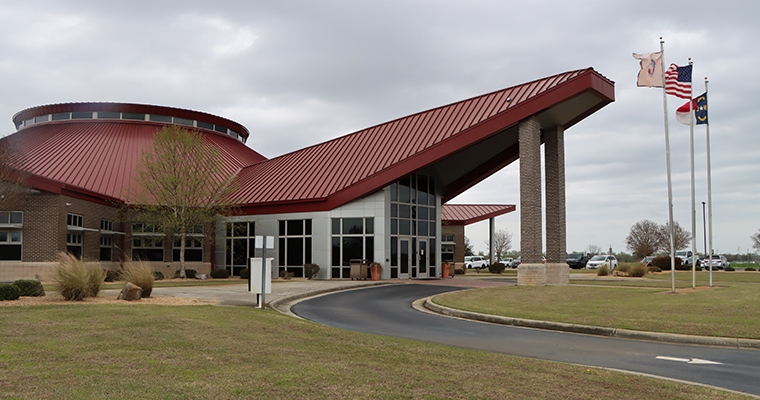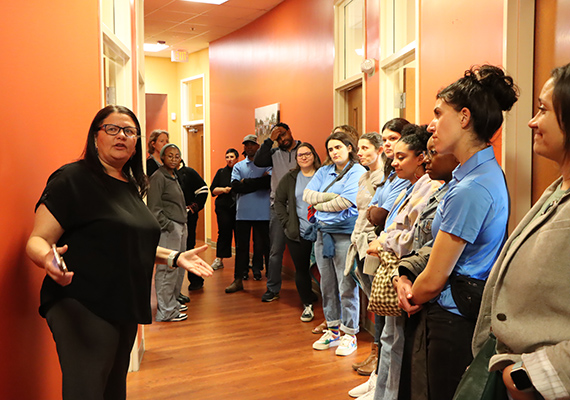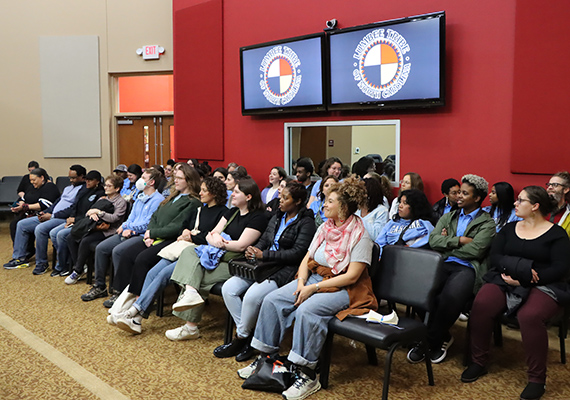By Matthew Smith
Gaining insight into and building a relationship of respect with North Carolina’s largest Native American tribe was the focus of a University of North Carolina at Chapel Hill School of Social Work trip to Robeson County.
More than 40 students — mostly UNC School of Social Work Golden Policy Fellows — and half a dozen faculty members traveled two hours south to Pembroke, North Carolina, in March. The group met with leaders of the Lumbee Tribe, learned how its history shaped its past and present, and explored ways to work in partnership with the tribe to help support its community efforts.
“Truly partnering with a community in a way that is respectful and culturally relevant doesn’t happen by accident,” said Jessica Lambert Ward, a clinical assistant professor and member of the Lumbee Tribe. “We’re modeling for our students what it looks like to engage with communities in a relevant, respectful and transformational way.”
“Hearing from community and engaging with empathy allows us to learn more about community needs and the contexts that have shaped the social issues that communities face. I hope this trip is just the first step in building a mutually beneficial partnership between the School and the Lumbee community.”
A historical perspective
While on the campus of the University of North Carolina at Pembroke, students learned about the history and culture of the Lumbee Tribe at the Museum of the Southeast American Indian. From artwork created by local tribe members to the resistance against systemic oppression led by Henry Berry Lowry, students gained insights into the events, traumas and successes that inform the outlook and perspective of tribal members today.
“I can imagine that a lot of the issues these students will work on in the future with families, youth and communities all come from somewhere,” Museum Director Nancy Strickland Chavis said. “These issues are rooted in some sort of historical trauma or legacies that come from their lived experiences or their families.
“We deal with those issues by talking about colonialism and native peoples. This was a great opportunity to talk about the systemic issues and talk about instances of our history and how that history has played out behaviorally through generations.”
Travis Albritton, associate dean of diversity, equity and inclusion, said he often reinforces decolonizing social work in his classes — which includes incorporating Indigenous histories, values and knowledge into practice. He said that giving students a first-hand look into what life is like for the state’s largest Indigenous community was an effective way to have them think more deeply about the issues Indigenous communities face.
“I hope our students gained a new historical perspective,” he said. “I hope it gave them a new lens to view history through when they engage in their own practice. They got to see what a rural community has to offer and started to really build relationships with one another and across UNC System institutions.”
Mary Ann Jacobs, chair of the American Indian Studies Department at UNCP, shared some of those historical traumas with the group.
Historical trauma is trauma that is experienced by many generations of a community, usually by cultural, ethnic or racial groups. For the Lumbee Tribe, that included pre-Civil War disenfranchisement and Jim Crow laws that often saw three levels of segregation — white, Black and Native American — in Robeson County.
She also discussed ways the community has healed, including earning state recognition, hosting tribal cultural events, offering government programs and services, and leading robust education, religious and banking programs.
“I really enjoyed the tour,” said Eyram Bossiade, a student in the School’s 2-year MSW program. “It gave me a chance to reflect and tie together some of the things we heard about to African slavery and African experiences. Learning about things like tri-segregation in Robeson County was really interesting. I’d never heard about that before, but that being brought into light puts so much truth to their whole reality and paints a more complete picture that I really appreciate.”
At the front door
The students’ learning opportunity didn’t start on the ground in Pembroke, but on campus with UNC American Indian Center Director Danielle Hiraldo.
Hiraldo, who is also a citizen of the Lumbee Tribe and served as a researcher for the Native Nations Institute at the University of Arizona, shared her wealth of traditional and academic expertise with the group.
Her pre-trip lecture highlighted native sovereignty, the difference between federal and state recognized tribes, and how that difference translates into the ways they assert their sovereignty and the services offered in those communities.
“We often share with students interested in engaging with tribal communities the importance of doing their own research and positioning themselves in a humble place of wanting to learn,” Hiraldo said. “More importantly, students need to understand that protocols and systems exist within tribal communities. To engage with tribal communities effectively one must respect the sovereign authority of the nation.”
Hiraldo and the Center’s connections helped the School’s students meet the tribe “at its front door” Lambert Ward said, as they toured the tribe’s headquarters and the Lumbee Cultural Center. Students heard about the different services the tribe offers, how members retain their tribal membership, and more from Lumbee Tribe Director of Governmental Affairs Tammy Maynor.
Some of the services provided by the Lumbee Tribe include Indian education programming, home and housing programs, and energy assistance. Students also learned about the Lumbee tribal governance structure which includes executive, legislative and judicial branches.
“As much as we hear about these experiences and study them in class, it’s really different to physically be here and see it in action,” 2-year MSW student Chenoah Hassan said. “We do not have the same shared experiences, but we can be open to learning about them and understanding people from different backgrounds.
“I want to be a therapist in the future and understanding how communities are structured, learning about their support systems, and being able to have a framework for how I will interact with them when it comes to what I do in my future practice is great.”
With the trip complete, Lambert Ward and Albritton hope to further develop the partnership into a service-learning opportunity that would allow students to enhance their social work skills while engaging with the community.
“We envision this being something that we continue to cultivate and sustain for a long time,” Lambert Ward said.
Related stories
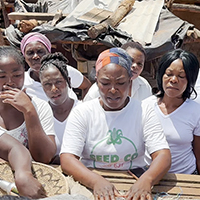
A group representing UNC School of Social Work visited Solwezi, Zambia to learn more about local women’s savings and credit groups.
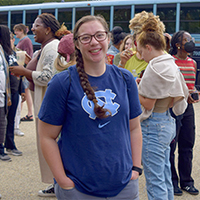
Studying oppression and resistance
UNC School of Social Work graduate students traveled to Washington, D.C., where they had the opportunity to deepen their study of oppression and resistance.

